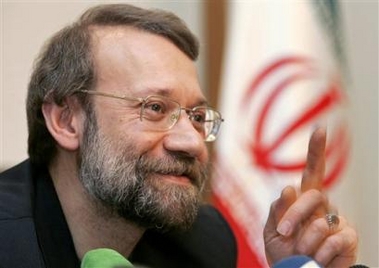|
Iran blames US for stalled nuke talks
(AP)
Updated: 2006-03-03 09:28
Iran's top nuclear negotiator headed for new talks in Vienna Thursday with angry words for the United States and no reported progress on a compromise to end the international standoff over the Islamic republic's suspect atomic program.

Iran's top nuclear negotiator Ali Larijani gestures at a news conference at the Iranian Embassy in Moscow, Thursday, March 2, 2006. Larijani said Thursday that no date has been set for the next round of talks with Russia on its offer to host the Iranian uranium enrichment program, but added that Tehran will have talks with the European Union before next week's meeting of the United Nations nuclear watchdog. [AP] |
Ali Larijani was to sit down Friday with key European foreign ministers and senior nuclear negotiators, just three days before the United Nations nuclear watchdog meets in the Austrian capital to recommend action to the U.N. Security Council, which has the power to issue sanctions against Iran.
On Thursday Larijani accused the United States of scuttling Moscow talks that ended with no movement reported toward a deal that would move part of Iran's nuclear program to Russia, to assuage concern that Iran would divert enriched uranium to make a bomb. Iran, which restarted some enrichment activities last month after a voluntarily freeze, says it wants only peaceful nuclear energy.
"America is lying, trying to destroy the Russian proposal," Larijani said at a news conference in Moscow. "The Americans' insistence on handing over the Iranian nuclear dossier to the U.N. Security Council means the destruction of the Russian proposal."
In response to the unusually heated rhetorical assault, State Department spokesman Adam Ereli said: "If Iran has a problem with the state of affairs and the situation it finds itself in, Iran has only itself to blame."
A diplomat familiar with the negotiations, who spoke to The Associated Press on condition of anonymity because he was not authorized to discuss them, said Iran had requested the Vienna meeting.
The diplomat said Britain, France and Germany would not compromise Friday on their demand that Iran give up enriching uranium inside its borders.
For the meeting to be productive, a letter from the three nations' foreign ministers said, Iran must give a clear commitment to return immediately to "full and sustained suspension of all enrichment-related ... activity." The letter, dated Feb. 27 and shared in part with The Associated Press, also demanded that Iran recommit to allowing the U.N.'s International Atomic Energy Agency pervasive, short-notice inspections of its nuclear activities, after withdrawing such rights last month.
Enrichment is a process that can produce fuel for a nuclear reactor or fissile material for a bomb.
A European official suggested France, Britain and Germany had agreed to a final meeting with Iran's negotiator before the IAEA board meeting next week to dispel any notion that Europe was not interested in a negotiated solution.
"We are in a listening mode — nothing more," the official said by telephone from outside Vienna. He also spoke on condition of anonymity because he was not authorized to discuss the negotiations.
Meanwhile, a key Iranian opposition figure said that Iran has ramped up its production of missiles capable of carrying atomic warheads.
Providing what he said were secret details of those missile programs, Alireza Jafarzadeh told the AP Thursday that Iran had "significantly increased the production line" of its Shahab 3 missiles last year, and was now turning out 90 a year — more than four times its previous production rate.
Jafarzadeh has worked for the political wing of the Mujahedin Khalq, an Iranian opposition group that Washington and the European Union list as a terrorist organization.
Jafarzadeh, who heads the Washington-based Strategic Policy Consulting think tank, helped reveal what was then Iran's clandestine nuclear program three years ago. In January he divulged details of Iran's enrichment plans, which were confirmed a few days ago by the IAEA.
However, other accusations he has made against Iran remain unproven. There was no independent confirmation of the information Jafarzadeh offered Thursday, which he said he received from unspecified sources inside Iran.
The most advanced Shahab has a range of nearly 1,200 miles, Jafarzadeh said. That is enough to target arch-foe Israel.
Working together with North Korean experts at the Hemmat Missile Industries complex in Tehran, Iranian engineers also were "70 percent" finished on prototype Ghadar 101 and Ghadar 110 missiles, which have a range of up to 1,800 miles, he said, putting central Europe within reach. These missiles also were "ready for launch" within 30 minutes, compared to several hours for the Shahab, he said.
U.S. intelligence chief John Negroponte told lawmakers Wednesday in Washington that the risk of Iran acquiring nuclear arms and merging them with ballistic missile systems was "a reason for immediate concern."
Meetings that started in 2004 between the Iranians and Europeans failed to find common ground on enrichment, leading to a chain of events that resulted in the IAEA board reporting Tehran to the security council Feb. 4.
In exchange for backing that move, Russia and China — which have strong political and economic ties to Iran — insisted the council wait for the results of Monday's IAEA board meeting before taking any action.
Larijani said his team had put forward a "package proposal" in Moscow, and denied that the discussions had ended in failure. "We need to give diplomats time to look at it."
A Russian nuclear agency official, who spoke on condition of anonymity because he was not authorized to speak to media, confirmed the Moscow talks had snagged over Iran's refusal to freeze enrichment.
|